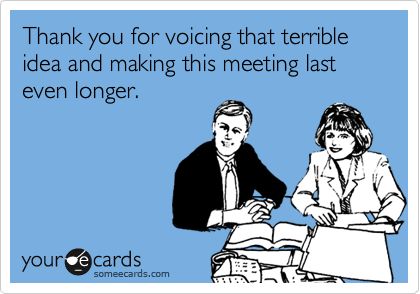Most people probably wouldn’t argue with this: the two biggest time-sucks in standard corporate existence are (a) e-mails and (b) meetings, probably in that order but fluctuating by day. Interestingly, e-mail will probably some day go the way of voice mail (which has broader implications for marketing divisions than work managers, although marketers will probably just go flood the SMS zone). Meetings probably aren’t going anywhere, at least at most companies. It’s almost something people are resigned to, which is a fucking mess because they often don’t accomplish anything except sucking time (and morale, and human decency) out of a group of people. To wit:
- They almost never begin with everyone on the same page or having the same interest level.
- Everyone seems to know they’re meaningless for the most part, but people still keep trudging to them.
- Often people throw out contextual “solutions” or name-drop people with absolutely no context.
- We always think they need to be about a specific topic, but that’s not at all how a lot of entities (military, athletes) work.
- People send shit around before the meetings, and no one reads them — so everyone’s scrambling with small talk and catch-up as they begin. This could change, but won’t.
- Usually the invite list doesn’t even include the 2-3 people who will actually end up doing the work.
Basically, meetings are a steaming pile of feces more than 60 percent of the time. Yet everyone continues to call ’em. Could there be an easier way?
This chart has been making the rounds. It’s from Harvard Business Review, but I stole it from Fast Company because I’m fat, lazy, and entitled:
This is a good chart, and inherently it’s very logical. Here’s the problem. Most people aren’t logical.
You know what destroys most work teams, honestly? It’s not “a toxic boss.” (All bosses are toxic at some level.) It’s not “Well, Tim is an idiot!” (Everyone is an idiot, and thinks they’re a genius, at some level.) It’s not “lack of communication.” (Show me a place that communicates well and I’ll find a fucking unicorn in the copy room.)
You know what it really is?
It’s the fact that most work teams are primarily made up of people who lack self-awareness.
Oftentimes, the No. 1 person on a given team who lacks said self-awareness is the manager of that team.
Look at the first item on this flow chart — the one in black.
Have I thought through this situation?
OK, so if you think “No,” you should stop and think and figure out what you’re trying to accomplish. If you think “Yes,” you move on. (It’s like a board game!)
Here’s the problem with this: most managers lack self-awareness and think of themselves as “The Boss Man!” (or corresponding gender), so their response to this is almost always going to be “Yes.” They’ll think, “Well, this is fleshed out. Let’s keep it going!”
Even if they have a modicum of self-awareness and think “This is a train wreck with no direction, so maybe…” they’ll probably stop themselves and say, “But I’m the boss, and I have deliverables, so I need to keep this moving along…”
This all goes back to the basic puritanical bullshit associated with work and work as virtue and doing good work and managing well and all that. It’s mostly garbage. Work is a neighborhood. People throw turds over the fence and put up ugly trees. It happens. You’re there as a means to an end, and at the end of the day, the whole idea of “management” is more about empathy than anything else. The deliverables will always be there.
Bottom line is: good chart, and probably helpful for some. But most managers I’ve ever worked for or encountered would just keep saying Yes, because they believe they gotta keep cranking and grinding and hitting those targets and deliverables. That’s the way, right?!?!?
In related news, please stop scheduling conference calls.


Bahaahahahahah! Love this…I’m cracking up. Most managers think that if they’re meeting about things and talking about things, then they’re doing their jobs. The “action items” (gagging) always seem to be that someone else has to do more work, not that they themselves need to assess their meetings and determine the return on all that bloviating.
LOL. Sadly very true. So sadly.
I personally don’t have a lot of meetings, and I almost never feel busy. So the reality is, there isn’t actually a lot of work. There’s a lot of talking about work.
Yes, lots of talking about work…you’re lucky to not have so many meetings…that usually leads to more autonomy, which is always good.
Reblogged this on Kenneth Leung, Thinking, Seeing, Living.